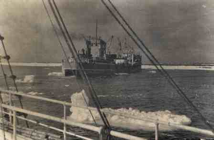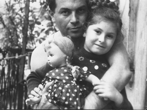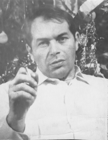Sea Pilot on the Smokestackby V. Ulea |
Part 1 appears in this issue. |
| conclusion |
Pitch Dark
After leaving the army he applied for a job in the famous whaling fleet “Slava.” He took his camera with him, and thanks to it we have the pictures that I use for this film. His photos and diaries are the best witnesses of the difficult and risky nature of his work at that time.
The night is pitch-dark. The many-tiered clouds hide all celestial bodies. No star crosses the skies, and the moon doesn’t illuminate the gloomy ocean, and the ice files extend to the horizon. Far off, on your right, you rather feel than see a huge iceberg. The moans of the fierce wind are heard everywhere. Splashes of icy salt water douse those who are standing on the captain’s bridge.

The sailor on duty looks ahead while the crew sleep quietly in their warm cabins. The darker the night and the stronger the wind are, the more watchful is the sailor on duty. The night is full of hazards. Huge icebergs stud the ocean, and drifting ice floes are in our way. It’s impossible to discern them even when they’re nearby. You must be watchful on duty. Sometimes a snowfall begins, in addition to everything. The wind blows through, penetrating all the chinks in your clothing.
Oh, how far we wandered off! Seas and oceans, thousands and thousands of miles are left behind us and as many are in front of us. Our relatives and friends, our dreams and hopes are left behind along with our life — new cheerful life with its genuinely epic vim.

There’s no time for melancholy. Still, sometimes, especially when it’s stormy, you feel homesick, and at that moment your homeland becomes a thousand times more beautiful, as if you were observing it from a high mountain.
“Genuinely epic vim”... I disagreed with my Dad and often wondered why he was so enthusiastic about a country that gave no cause for enthusiasm. Only much later did I finally realize that for a sailor the native shore was always sacred, like a Promised Land that he strives to reach during his difficult sailing. No wonder he sees everything in a different light! This is the psychology of a sailor, whether he is retired or not. People think that sailors romanticize the sea. I, however, believe that it’s the shore that sailors often romanticize. The sea is their routine and it’s very unlikely that they idealize it. In the sea they are strong and skillful, whereas on the shore they are real children. Such was my Dad.
* * *
Later on, he began to sail abroad. At that time he was already captain of a ship on a long voyage, and a journalist. His essays captured the readers’ hearts, and his style was truly mesmerizing. People stood in line to buy a newspaper with his next essay. An editor of a well-known magazine, Soviet Fleet, wrote him a letter in which he asked him to continue working with the magazine and to send new articles to it.
Back home! The ships turn north — a desired course. It’s stormy. It’s cold. It’s a blizzard. But what all this means when the front of the ship looks there where the homeland lies, a thousand miles from here!

A cold southwester carries the watery spray, and it accumulates on the beard and eye-brows, freezing them. Its icy, thorny streams flow down the back until they get warm from the body. At the end of the watch you’re shaking and dancing from the cold. But it’s nothing: no matter what, we head north, back home.
The Bosporus lies behind the stern. The Black Sea extends ahead, and everything changes right away. “The Black Sea, the Mediterranean Sea — what difference does it make? Water is water everywhere, and the same is with the skies,” one may think. But there is a difference.
The smell of iodine seaweed is brought from far away, and the stars look dimmer and more familiar. It seems that even the dolphin jumps differently around the deck. Oh, how these last minutes drag!

The last minutes... Not months, not weeks, not even days — but only hours... At the dawn the familiar shape of the shores will appear, and then — the familiar buildings, and then — the familiar faces who’ve been waiting for you during all those months of your voyage...
A Gypsy’s Prediction

|
When I was three I rhymed my first lines, which my Dad wrote immediately after me: “Run to the forest, little fox / there you hide behind old oaks.” Dad was my first literary adviser, my critic and my friend. I often strolled with him along the park and fantasized, and listened to the world around me. On my first poetry notebook he wrote the following dedication:
|
Set goals in everything you do — |
* * *
He continued working late at night at his desk piled up with papers. I still remember his lamp that resembled a white mushroom. His desk was in my bedroom, and there was nothing cozier than falling asleep under that soft light and the rustle of his pen. The image of the cozy home was associated with him working late at night at his desk. That created a feeling of reliability as if he was on his watch, protecting our home from the dark turns of life.
* * *
More than once providence saved him from death.
One day he was going on duty. He kissed both of us and left. I heard his energetic steps downstairs. Without him our house always looked smaller, as if it lost its confidence and cheerfulness, and only a record with my favorite song about Odessa could somehow cheer me up. I began to wonder if I should listen to the song or cure a doll that had suddenly gotten ill as I heard my father’s voice. He entered the room, talking to my mother. Both of them looked alarmed.
“So, what happened next?” she asked.

|
As soon as he finished a cry was heard from the outside. My mother looked out and saw people running along the street. We also rushed downstairs.
“What happened?” my mother asked the neighbors.
“What? Haven’t you heard the news? A tram just jumped the tracks. A lot of people are crushed. Make sure there is no one of yours in it.”
It was one of the biggest summer tragedies in Odessa, when overcrowded trams turned into red human bodies. My Dad remained safe and sound owing to the mysterious circumstances.
|
And he gazed at the tram caught on fire By the sunset and burning All the leaves on its way. And the city has vanished, And his memories left him at once. He was no one going to nowhere. Only sands were under his feet. But he’d no one to look for Or meet. |
Again the 13th
A big explosion in the seaport put an end to my cloudless childhood. The explosion was during my father’s watch. It happened on January 13, 1972. On the eve of the explosion my Dad stopped by to put on warm clothes. Soon after we said goodbye to each other a terrible blast shook the city.
11 a.m. I went home to get warm clothes, and forty minutes later I was back at the seaport. There, terrible news awaited me: a ship, the Mozdok, had collided with a Bulgarian tanker, the Lom. The Lom exploded and everyone in the central superstructure perished.

I remember the explosion that powerfully threw up the image of our last meeting. News that something went wrong at the seaport spread instantly. “Nothing will ever happen to you,” I whispered repeatedly in the silence of our home, and my whisper sounded like an incantation against the number thirteen.

|
Never had he been on duty for such a long time. How many days was he gone? A week? Two weeks? The alarm was growing, and the news didn’t bode well.
I awoke from the touch of his cold cheek. He arrived early in the morning and, without even taking off his woolen coat, rushed to my bed. My mother was next to him, silent. Well, that winter was another trial to him.
He returned home as if nothing had happened and went to sleep, covering himself with his woolen coat. Our life continued despite the deady cold that enchained the sea in ice. Two years later, a short commentary was published in our newspaper.
Sea Pilot on the Smokestack

|
In my father’s diary that day was marked by the following note:
August 18, 1974. I’m ascending a smokestack... yes, a smokestack of the ship, Mozdok! On my way there, I said that there was nothing like this in the history of navigation — a sea pilot on a smokestack. A reporter heard that and included it in his article. 40 hours on the stack!

* * *
After I published an article about my Dad I received a letter from one of the readers, a Ukrainian sailor who lived in the city of Kherson.
Dear Mrs. Vera Zubarev,
I’ve had a chance to read your article about your father, whom I happened to know. I met him in September of 1974, when he navigated our ship from Odessa to the port of Ilichiovsky. As we were passing the Mozdok he told us the story of the ship and how he navigated it to port. I took a picture of the ship, and I’m sending it to you along with my new collection of poems. One of the poems is dedicated to your father. I thank you for keeping the memory about your Dad.
Boris Goluban
* * *

|
To me, however, the meeting with my Dad was greater than all the historical events that surrounded his biography. Knowing him was the most significant thing in my life.
|
The soul strives for the depths of seas again. There, everything is known — the space distorted, The timeless quests that mirror in the water, And pitch-black darkness, from which life began. The soul strives for the depths of seas again. There, quickly, after summer, autumn follows, The day descends there in the twilight hours, And so do thoughts, once they can break constraints. The soul strives for the depths of seas again To taste the salt that flows through all the living And to observe them wandering in the evening Upon the edge of their uncertain end, To feel internally connected to the fates, Which stay alive through sacramental covenants, And to the rupturing of memorable moments Into eternities of fleeting yesterdays. |
* * *
That last day we strolled through the park. He observed the squirrel making her excavations under the tree.
“Dad, do you remember? Run to the forest, little fox...”
“There you hide behind old oaks,” he continued, laughing.
And then we took the leaf-covered path, walking hand in hand, and the leaf rustled under our feet, and we kept walking until we reached the shore where his ship was waiting for him.

|
He thought for a moment and smiled again.
He was only seventeen. The war rumbled on the background.
“Wait here, I’ll be back,” he said and waved his hand before parting.
“The attachment to home is much stronger” translated by Andrey Kneller
“The early pigeon’s voice resounds” translated by Andrey Kneller
“Depart forever” translated by Yelena Dubrovina
“Set goals in everything you do” translated by Andrey Kneller
“The soul strives for the depths of seas again” translated by Andrey Kneller
Copyright © 2009 by V. Ulea
